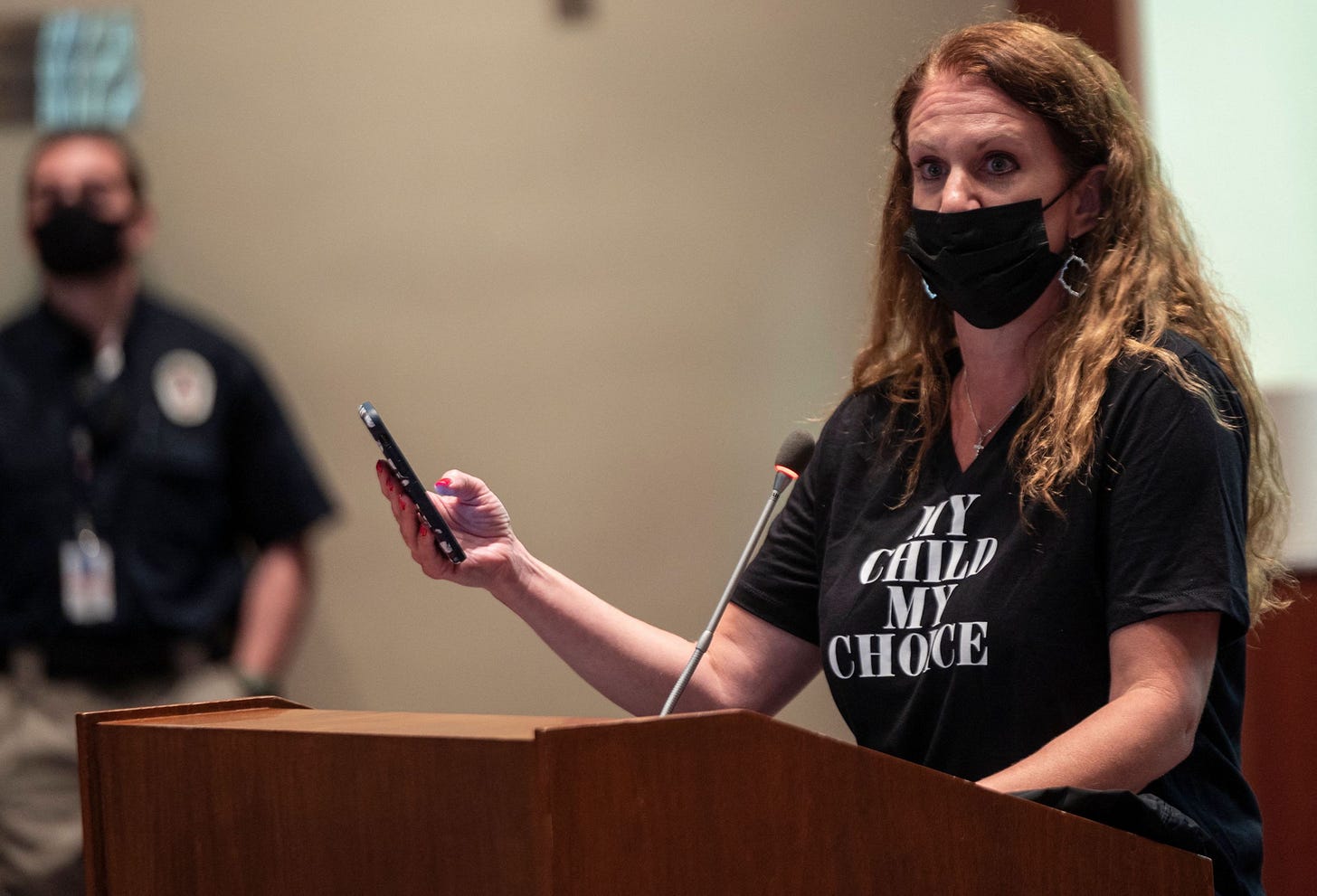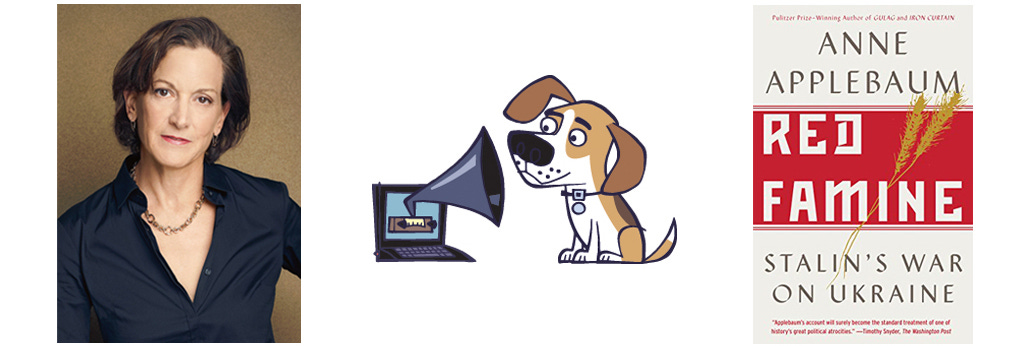The Backlash Against Trans Extremism
It's now happening in schools, and could take gay people down with it.

For the first 15 years of my life, I never heard the word “homosexuality” in my home or school. I only knew about sex at all because in my Catholic primary school, we had a class on the immaculate conception, and I was the smart-ass who asked what a maculate one would mean.
In my high school, there were no classes on sex. My Latin teacher — a legend among the boys — talked about it one day, and the morality of gay sex. He was admirably frank about why he thought it was not optimal: “It’s the wrong hole, isn’t it?” The only other explicit encounter I had with the matter in school was when I was sitting in the toilet and noticed a graffito. It read: “My mother made me a homosexual.” And underneath, someone else had scrawled: “If I gave her the wool, would she make me one too?”
I’m old but not that old. The speed of change has been dizzying. So it’s a little surreal to read about a 2020 training workshop at the National Association of Independent Schools conference. Here’s one teacher explaining the modus operandi:
Starting in Pre-K we talk about their bodies, the parts that they were born with, about penises and vaginas and whether they make somebody a boy or girl. But also their feelings, what do they feel like inside, do they feel like a boy or a girl? What does their head say? Do their heart and their body match up?
This is in Pre-K? The NAIS-approved core teaching about sex takes the experience of around 0.3 percent of the population, and bases the entire sex education of the 99.7 percent around an experience they do not have, will never have, and have never been faintly troubled by, and does this even before they’ve started kindergarten. You could, I suppose, call this trans inclusion. You could also call it a reductio ad absurdum.
From the same NAIS workshop, a teacher confesses she once got a bit carried away: “It was my first year so I was like, ‘okay, we’re just super progressive;’ so I went in there guns blazing and I just went for it. And I ended up talking about the vulva and the labia with Pre-K’ers.”
The NAIS represents private schools, so this is not an example of public school excess. Nonetheless, trans ideology is spreading, it’s in the culture and in the education grad schools. And if you want to understand why there’s suddenly a slew of ugly, dumb and overly vague new laws being proposed in state legislatures around the teaching about homosexuality and transgender identity, this is a good place to start. What started in ed schools has swept private schools and is now in public schools.
In fact, it’s an essential place to start. It is perfectly possible for teachers to teach about sex and be attuned to gender-nonconforming kids, who may be gay or trans or straight — without transforming all of sex ed to comport with critical queer and gender theory, designed to dismantle the concepts of binary sex and biology altogether, and to begin this indoctrination in pre-K.
But this is what the educational elite now believes in. Teaching materials are full of the new and highly nebulous concept of “gender identity,” they are intent on blurring sex differences, and, in truly regressive fashion, they define sex by gender-stereotypical behaviors. If a little boy is playing with dolls, alarm bells go off. If a little girl wants to wear pants, or call herself by a boy’s name, trans ideology now explains it. One of the most basic building blocks in a kid’s education — the distinction between boys and girls — is being undermined. And parents are then told to get with the program or else. In some cases, teachers have deliberately kept parents in the dark about the development of their children.
This is the danger of this new ideological education taken to its logical conclusion. The question, it seems to me, is this: How much of this is actually going on?
It’s very hard to tell. The Dish tried to nail down the actual content of various curricula for sex ed, and didn’t find that much to be concerned about: several cases of an attempt to coach a child’s trans identity while keeping the parents in the dark; and a couple of books that seem to have been assigned a little too soon for kids, or had some racy content. Some of the concern, of course, is around what teachers say informally, how they identify possibly gay and trans kids, and how they communicate (or don’t) with parents. In other cases, such as ending sex-specific bathrooms, or allowing some gender dysphoric boys to compete with girls in sports (and vice-versa), or medicalizing dysphoric kids to prevent natural puberty, the new doctrine is imposed without being included in any formal curriculum.
What seems undeniable, however, is that many public schools have adopted an understanding of sex and gender that is very new and derived from postmodern theories, all of which seem very weird to normal people, especially outside elite circles.
The imposition of this successor ideology has been hugely controversial among adults. Bringing kids into it was always going to be even more explosive. It’s one thing to be subjected to a struggle session at work; it’s another to find out your kid is having to go through the same. We have moved very, very swiftly from a time when it took real courage for a gay teacher to refer to his husband or her wife en passant to one where gender-queer transmasculine teachers cannot wait to teach their kids about the evils of “heteronormativity” and “queerness.”
I’m not a parent, but I’m hardly surprised that many are shocked when their children as young as five come home and start spouting these kinds of ideas, or when parents overhear it via remote learning. They weren’t consulted; some seem religiously offended; others just want to teach their kids themselves about deeply difficult topics; others still have individual children swept up in some of this, deemed trans by woke teachers, and are panicking.
The worry about gay kids is also real. If I had a gay son, I’d be terribly concerned that he’d be told his gender-nonconformity might mean he is actually a girl, and he might internalize this, given the authority of his teachers, and be moved into a trans category. This is what they do to gay kids in Iran. We cannot let that enter the classrooms of America. But the push to medicalize gender-nonconformity is real.
If parents object to the new ideology, they’re mocked, ignored or treated as bigots until the rage explodes in school board meetings, as it has all over the country. Below is a father in North Carolina, passionately defending his daughter from being fed CRT or being forced to compete with boys in sports. Take a moment and listen to him:
He is not a white supremacist, for Pete’s sake. He’s a parent. And he’s not having it. What he is expressing is what many Asian-American voters just expressed in San Francisco, with real fervor, and in a massive landslide. Public schools must not be engines of indoctrination. The Democrats’ refusal to take on their left-extreme — in fact, Biden’s complete capitulation to all of it — is creating a tsunami of opposition. Rightly so.
And this is the underlying force behind a plethora of truly awful bills and laws proliferating in state legislatures, which, in an attempt to prevent this kind of excess, could do a hell of a lot of harm. This is the moment many of us feared: when extremist trans ideology backfires, and takes gay men and lesbians down with it.
The Florida “Don’t Say Gay” bill, for example, bars any class discussion of homosexuality or transgender identity in the primary grades, and after then, only in an “age-appropriate” fashion. And “age-appropriate” is never defined. The law then hands the enforcement mechanism to parents who can sue if they think their kids are learning something not “age-appropriate.” The bill’s sponsor, Joe Harding, tried to reassure critics that the legislation would only seek to prevent “situations where a teacher is encouraging or initiating conversations through a procedure the school is doing,” rather than a blanket ban on spontaneous discussion from kids, but that’s not in the bill.
The vagueness is the point. It seems designed to terrify teachers, and chill any discussion of gay or trans subjects at all, at any age, in public school. It echoes the notorious Section 28 legislation passed in Britain under Thatcher to curtail left-radicalism in education, by banning “the promotion of homosexuality.” It was subsequently repealed, and apologized for by the Tory party itself. It’s reminiscent of the no-promo-homo laws for public education that were once passed in the US, five of the nine of which have since mercifully been repealed. And all these precedents show that this kind of moral panic legislation cannot last, should not last, and achieves nothing in shifting the terms of the debate.
What we need instead, it seems to me, is clarity and transparency about what exactly is “age-appropriate.” This is completely routine for all subjects, because toddlers and teens obviously need different approaches. And we should tailor teaching according to age. I’ve been an openly gay man my whole adult life, but I don’t think that kids in primary grades need to know anything more about homosexuality, let alone gay sex, than what they may pick up in the media or find out from their parents. For that matter, I don’t see why the tiny phenomenon of trans identity — much less than one percent of the population — needs to be centered in sex ed for eight-year-olds. But I do think public schools should teach the facts about sex, including homosexual orientation and transgender identity, as neutrally as they can.
Debating the details of a curriculum could be clarifying, as well as fraught. But that’s what democratic debate on sensitive subjects always entails. Clear standards of content, grade by grade, could steer a path between left extremism and right reactionism. Perhaps a more specific bill that mandated that teachers do not keep from parents any school counseling on gay and trans issues might help. That seems to be a core grievance. But there would have to be exceptions to protect some vulnerable kids from abusive parents. In the current Florida bill, sponsor Harding says there’s a section that states that full transparency with parents may not be mandatory “if a reasonably prudent person would believe that disclosure would result in abuse, abandonment, or neglect.” Vague again.
Clarity would also give teachers guidelines they can defend. Clarity could protect them from harassment or lawsuits. It should allow informal discussion of anything in the education process. It would treat the existence of sexual minorities as a fascinating, morally neutral fact about human nature, and help kids understand them better. They are variations on a theme. They are exceptions to the rule. And there is nothing wrong with that.
Such an approach would not condescend or single out gay and trans kids. It wouldn’t rush to pathologize or medicalize them. It would give them space, allow them to develop on their own, and treat them as future adults, capable of making their own minds up about the facts of life. It would focus on defending them from bullying, which is a far more proximate threat that “heteronormativity.” And it would then go on to focus on teaching kids reading, writing, arithmetic and the rest. Remember that? Education — without politics.
With any luck, many of these bills may die in committee. I hope they do — or get far clearer in their text. But what they show is that resistance to the woke revolution from above has now spread to parents who see it as a threat to their children. That’s a very powerful force. It may well obliterate the Democrats in November.
(Note to readers: This is an excerpt of The Weekly Dish. If you’re already a subscriber, click here to read the full version.)
Debate On The Dishcast: Anne Applebaum
We released this episode earlier in the week … because we don’t know what’s going to happen next with Ukraine and don’t want to be caught short by events. And who better to comment on Putin’s standoff than Anne Applebaum? She’s a staff writer at The Atlantic and the author of many formidable books, including Red Famine, Gulag: A History (winner of the Pulitzer Prize), and her latest, Twilight of Democracy: The Seductive Lure of Authoritarianism. One listener’s take:
I loved your (at times heated!) debate with Applebaum. It provides yet another example why The Weekly Dish continues to be among the best places to find stimulating conversation anywhere.
If you want to support future debates on the pod and haven’t yet become a paid subscriber, you can do so here. (Studio space ain’t cheap.)
For two clips of my back-and-forth with Anne — on whether the West provoked Russia into threatening Ukraine, and on what the US should do right now — head over to our YouTube page. Listen to the whole episode here.
That link also takes you to a big dose of dissents and discussion over the episode we did with John Mearsheimer on Russia and China. Here’s his take on the Ukraine crisis:
A listener writes:
I found Mearsheimer’s views rather jarring — which is surely a good thing! Lots to digest. Kudos for having two brilliant and formidable thinkers with contrasting views hold forth on the same topic. It has been a fascinating listen.
Coming next in geopolitics: a great and ranging conversation I’ve recorded with Edward Luttwak — the legendary grand strategist — about the broader tensions with Russia, China, and Brexit. Stay tuned. A teaser of the episode is available here — it’s Luttwak talking about his early opposition to NATO’s expansion and his opinion on whether Putin is bluffing right now on Ukraine. (Answer: probably.) Luttwak doesn’t think Putin has the weapons or army to win.
Dissent Of The Week: Are Hierarchies Always Oppressive?
A reader writes:
You say, “No, the left is not calling all masculinity toxic. But they get pretty quiet when you ask for a definition of non-toxic masculinity that doesn’t end up sounding like being a woman.” OK. Maybe so. But then you go on to defend Jordan Peterson’s worldview this way: “But his defense of nature, of hierarchy, and of order, resonates with men in a culture that bizarrely regards all three as forms of ‘oppression.’”
I ask you: Can you define the terms “nature,” “hierarchy,” and “order” without sounding like oppression?
Read the rest of that dissent, and my lengthy response, here.
As always, you can email us your constructive criticism and we’ll do our best to air it (please be concise so we can include as many as possible): dish@andrewsullivan.com.
Cool Ad Watch
In his continuing series of “the best ads of the last 20 years,” Copyranter resurrects a kickass one with kids:
In The ‘Stacks
This is a feature of the paid version of our newsletter spotlighting about a dozen of our favorite pieces from other Substackers every week. This week’s selection covers subjects such as proactive policing, “MAGA Christian nationalism,” and unionizing congressional staffers. A few examples:
Dusting off his Russian-English dictionary, comedian Jeff Maurer translates the joys of Olympic figure skating.
Donning his hazmat suit, Copyranter reviews flyers that spew actual white supremacy.
You can also browse all the substacks that Bodenner and I follow and read on a regular basis here — a combination of our favorite writers and new ones we’re checking out. It’s a blogroll of sorts. If you have any recommendations for “In the ‘Stacks,” especially ones from emerging writers, please let us know: dish@andrewsullivan.com.
The View From Your Window Contest
Where do you think it’s located? Email your guess to contest@andrewsullivan.com. Please put the location — city and/or state first, then country — in the subject line. Proximity counts if no one gets the exact spot. Bonus points for fun facts and stories. The winner gets the choice of a VFYW book or two annual Dish subscriptions. If you are not a subscriber, please indicate that status in your entry and we will give you a three-month sub if we select your entry for the contest results (example here if you’re new to the contest). Happy sleuthing!
The results for last week’s window are coming in a separate email to paid subscribers later today.
See you next Friday.






